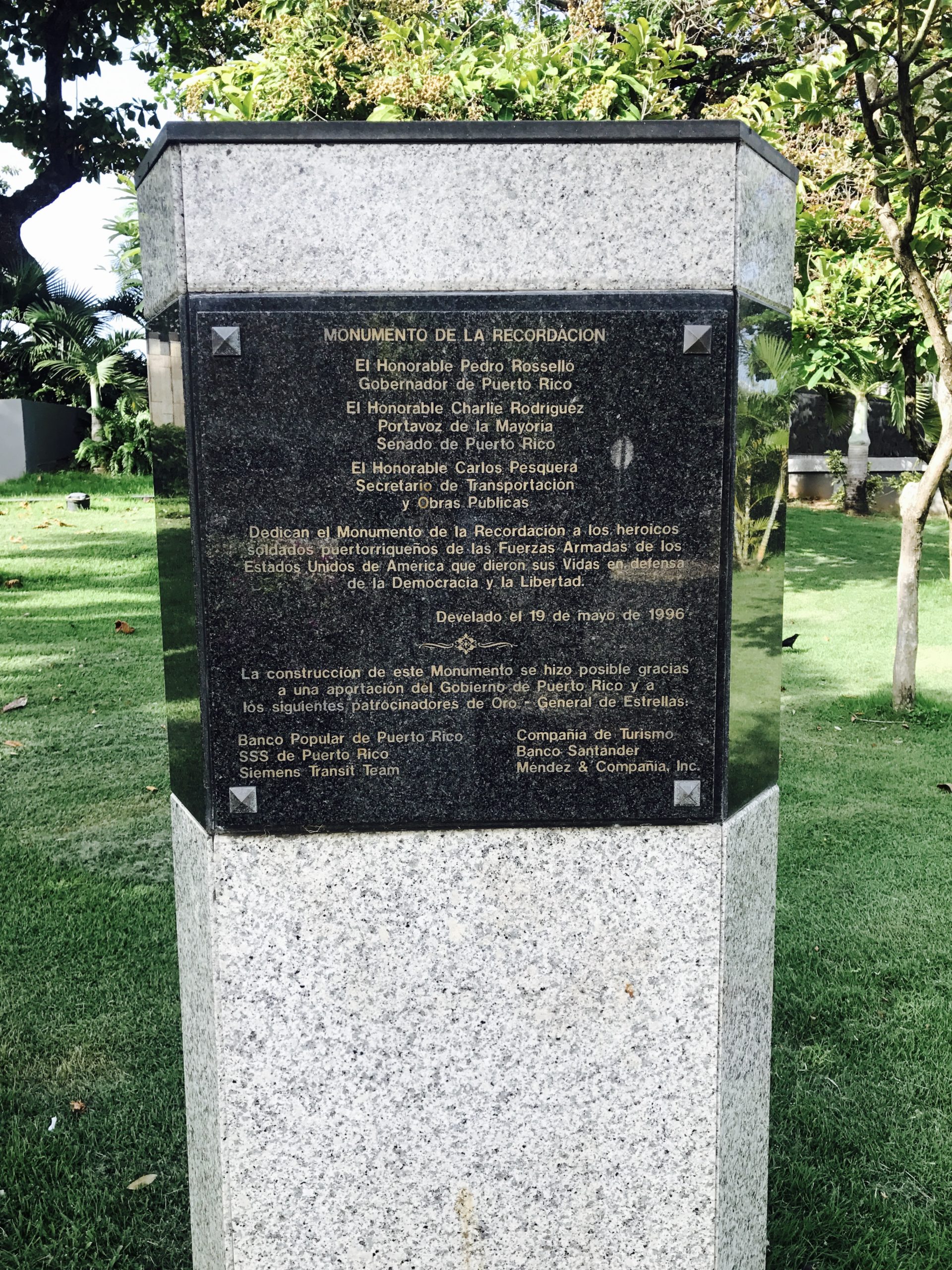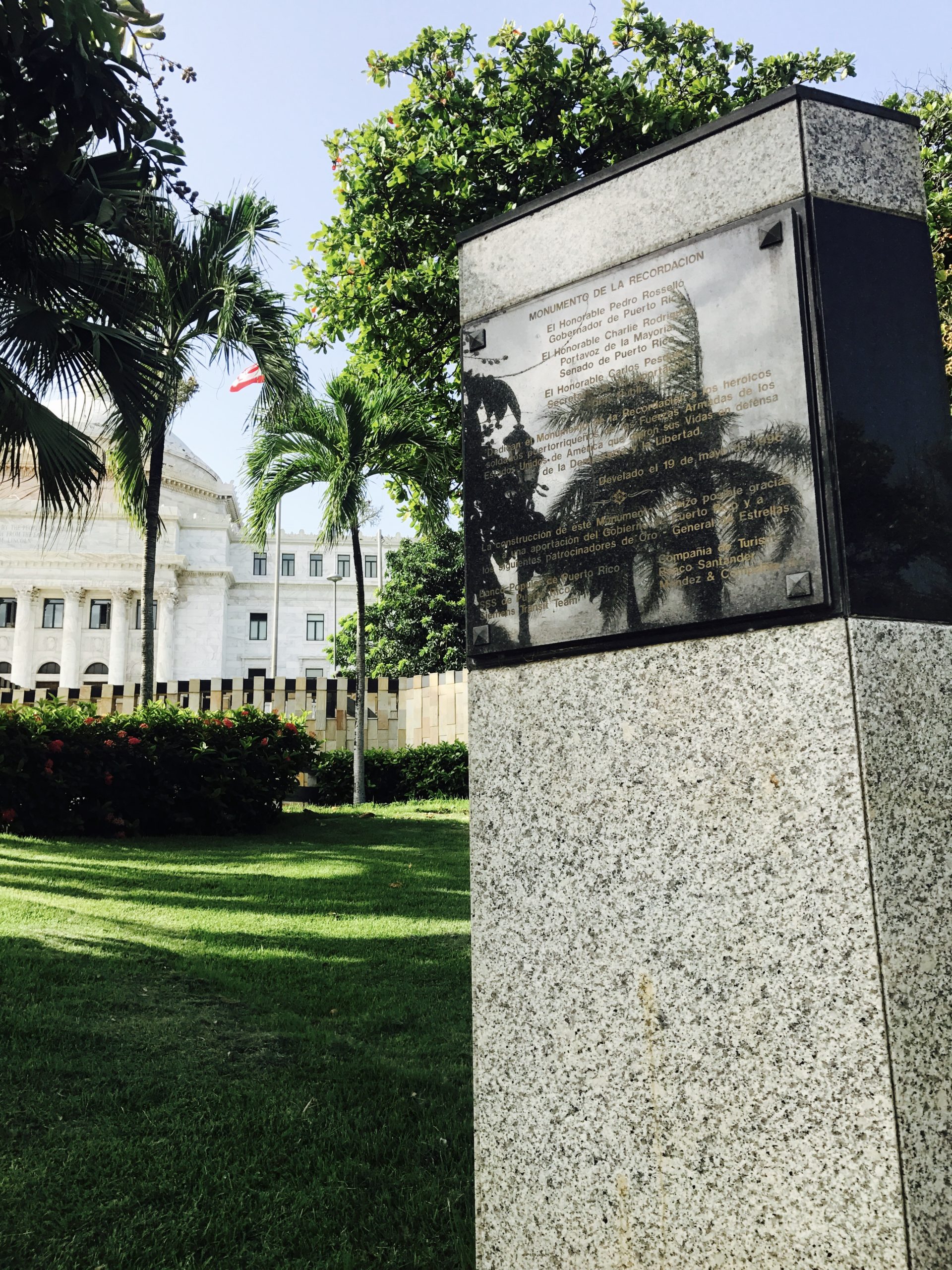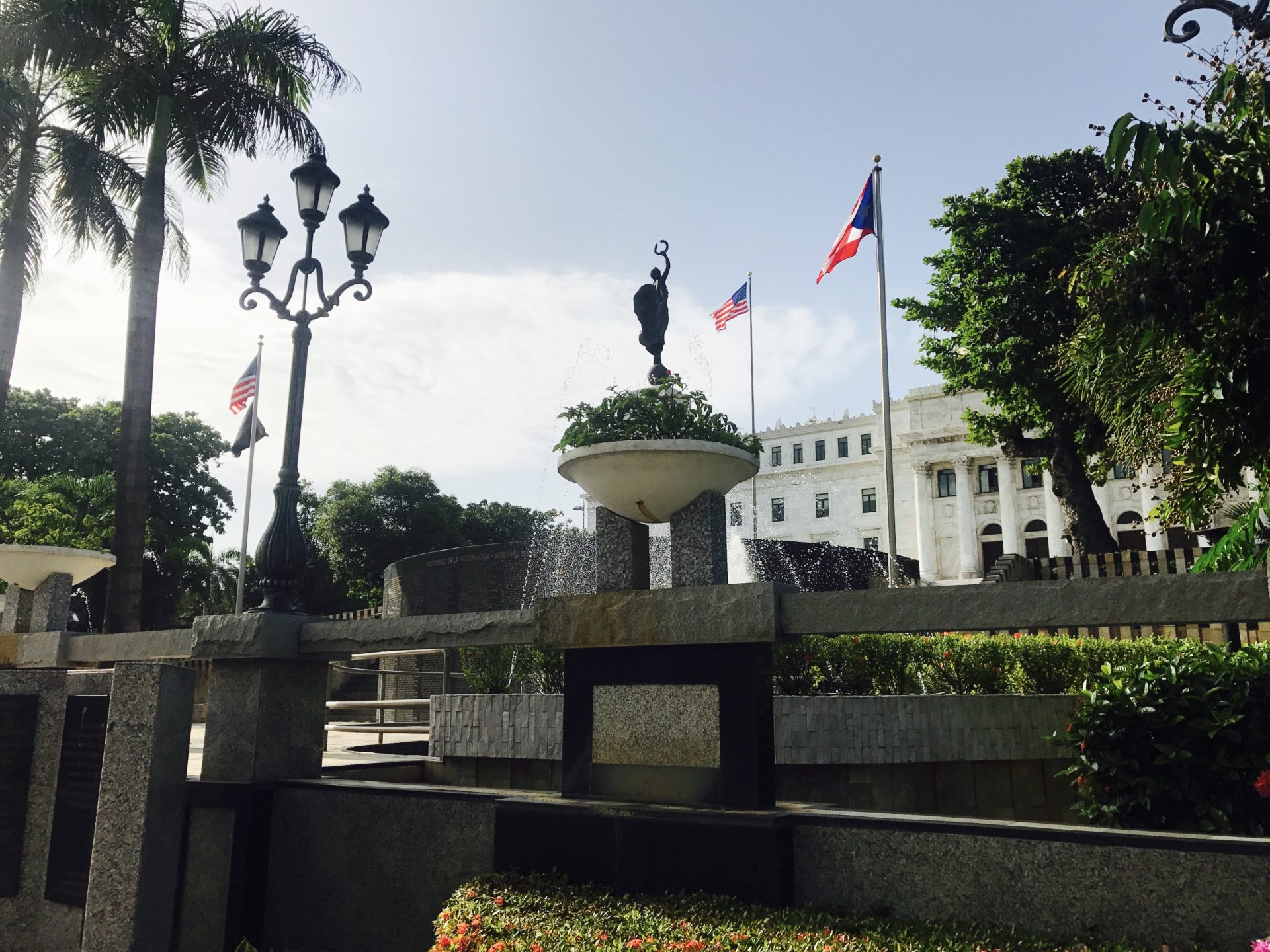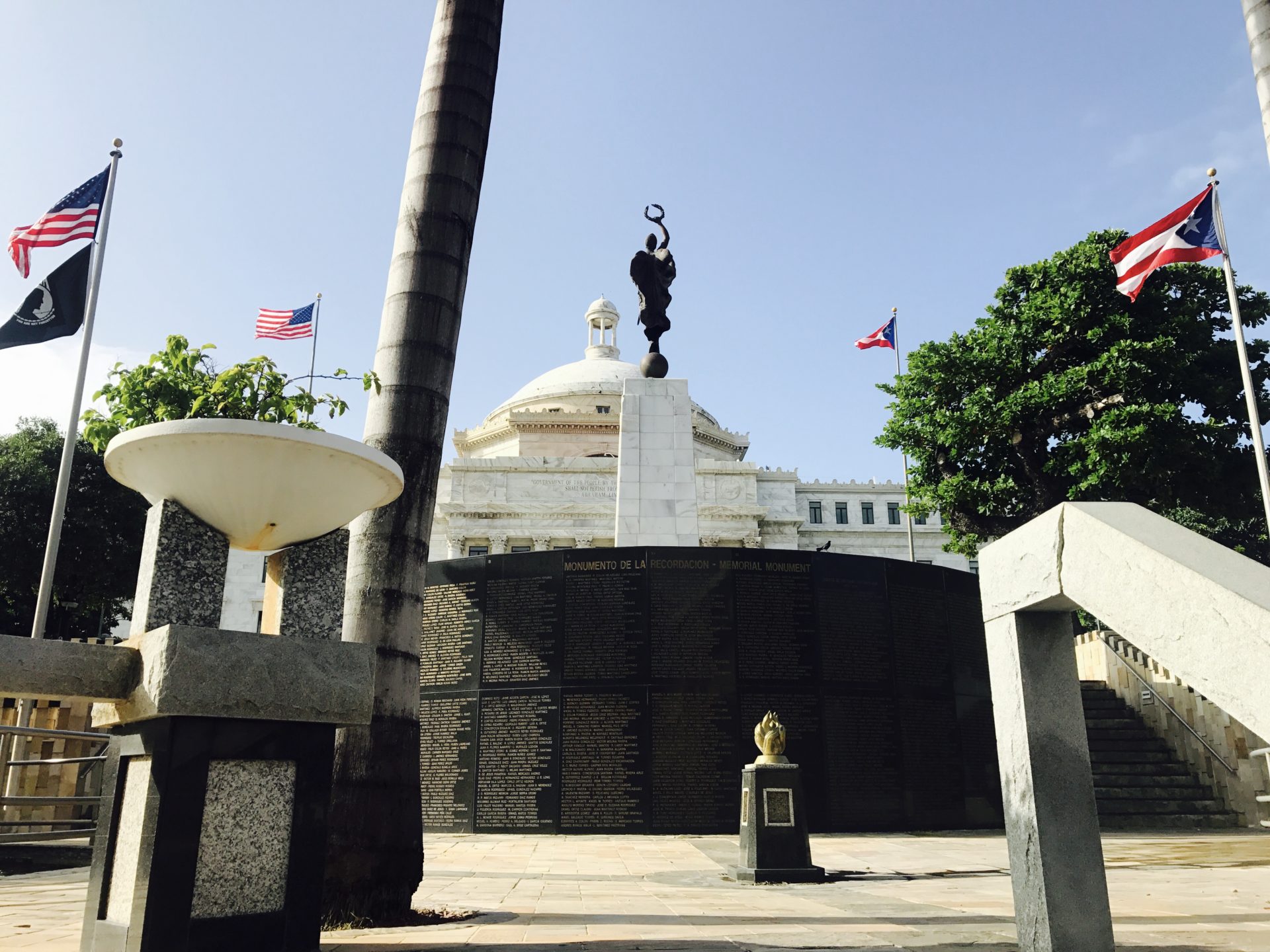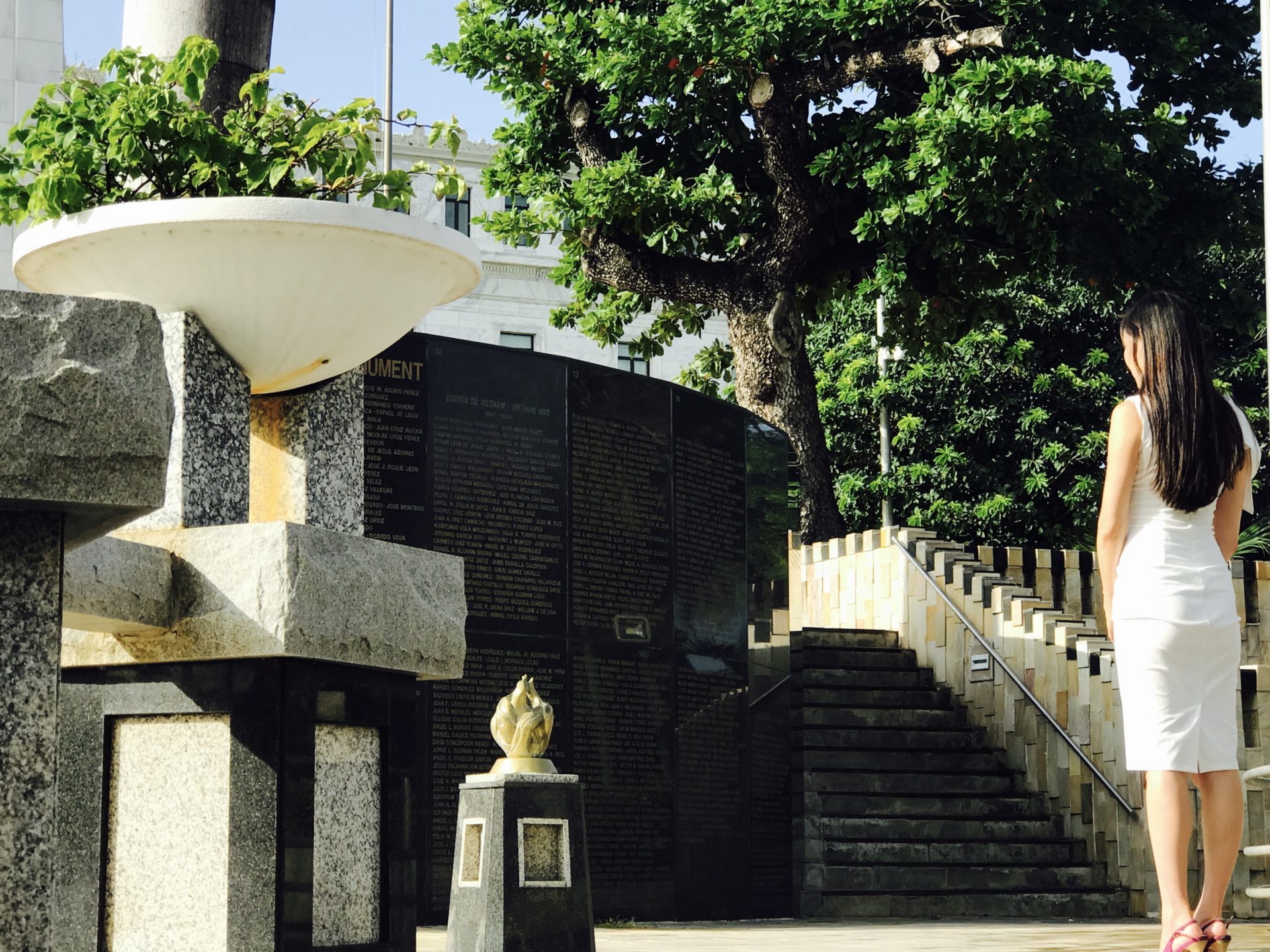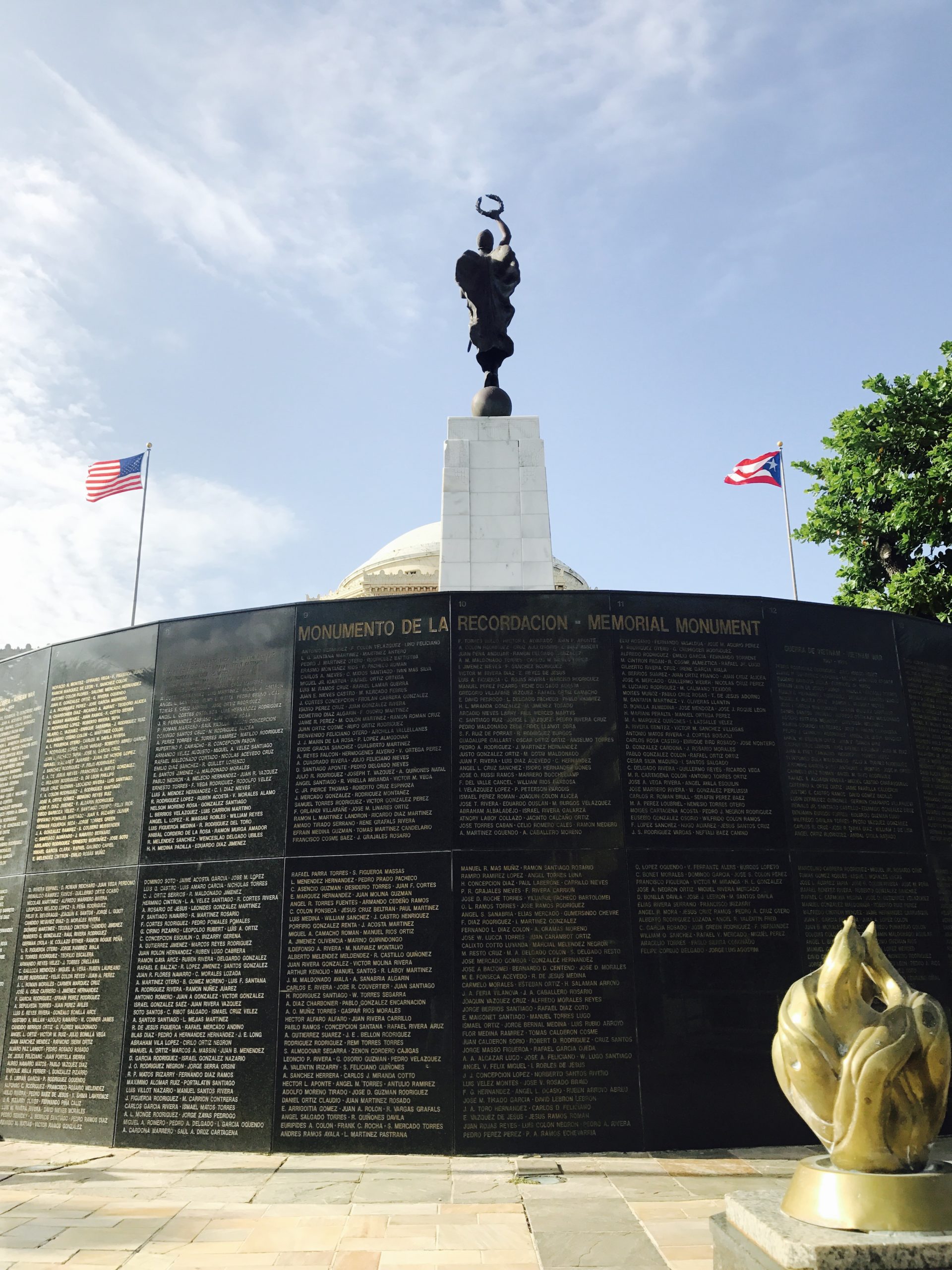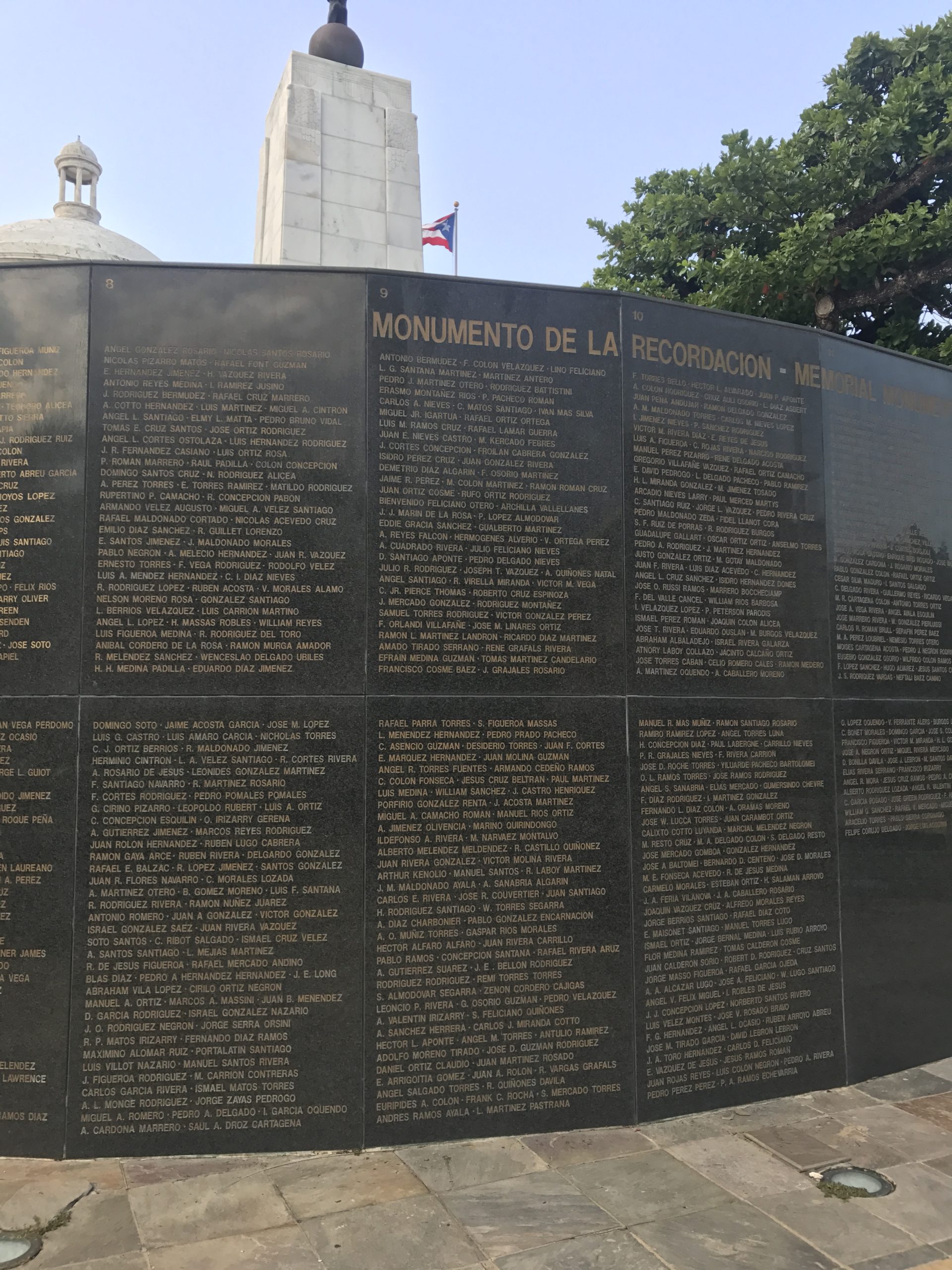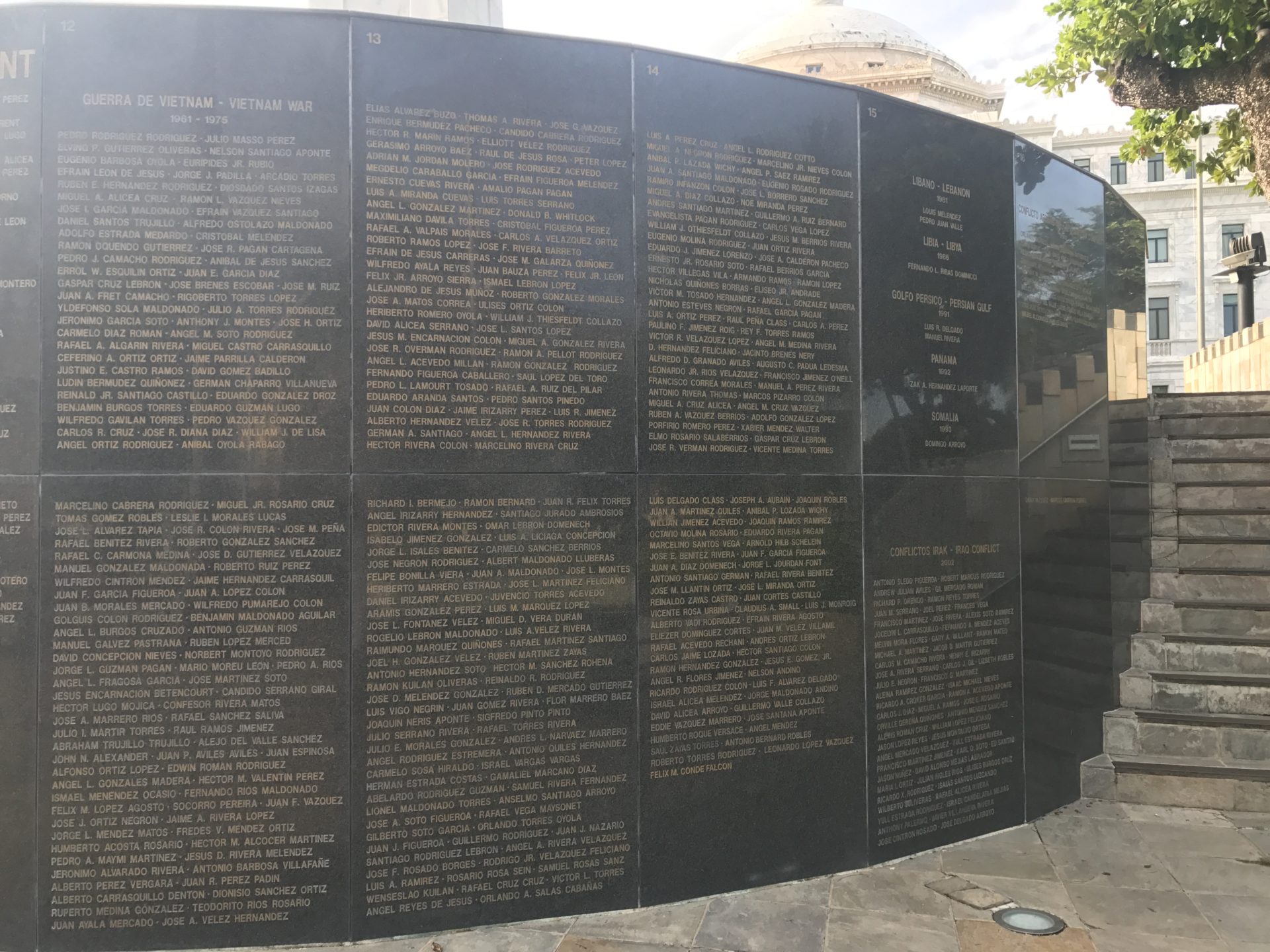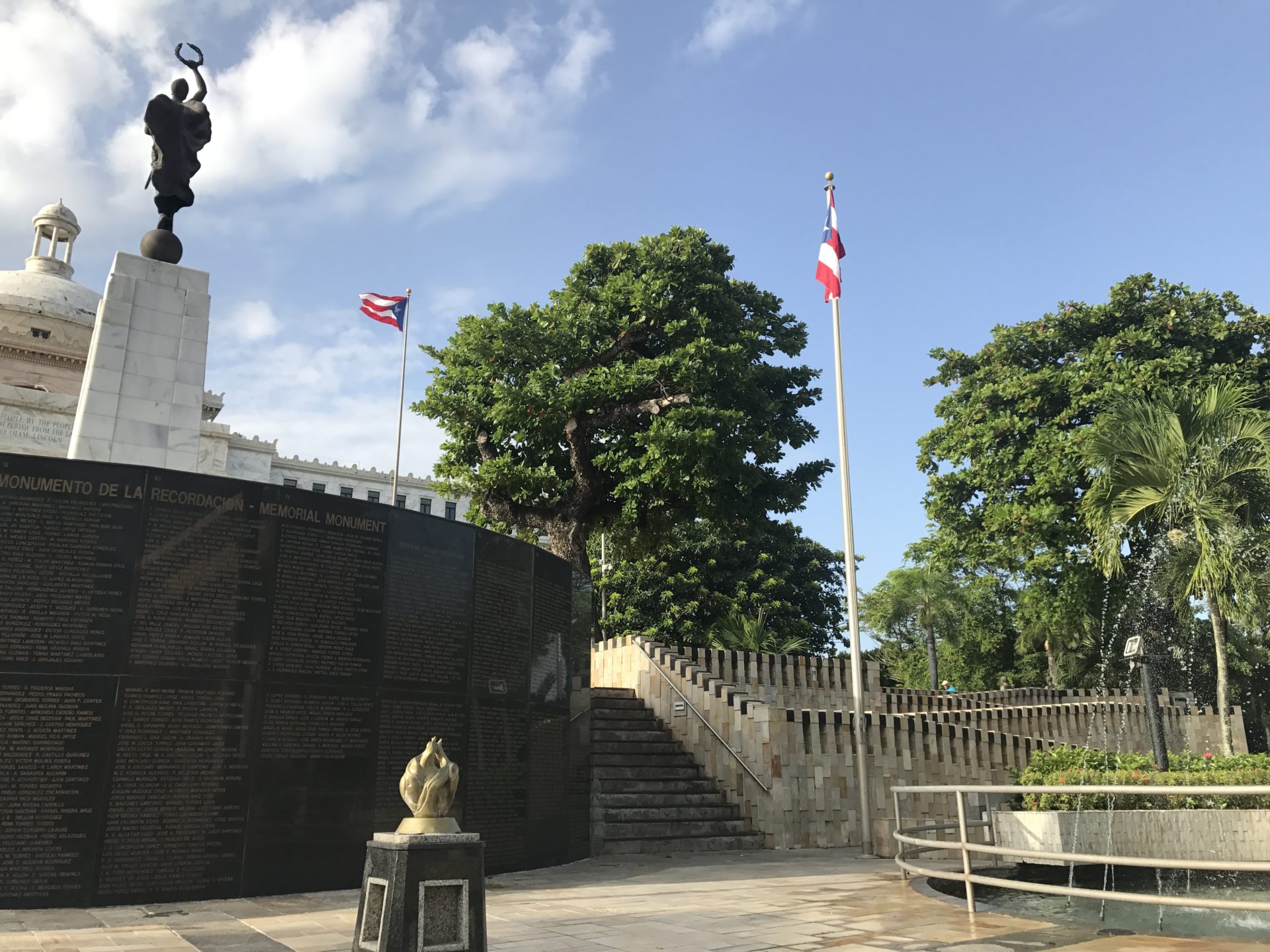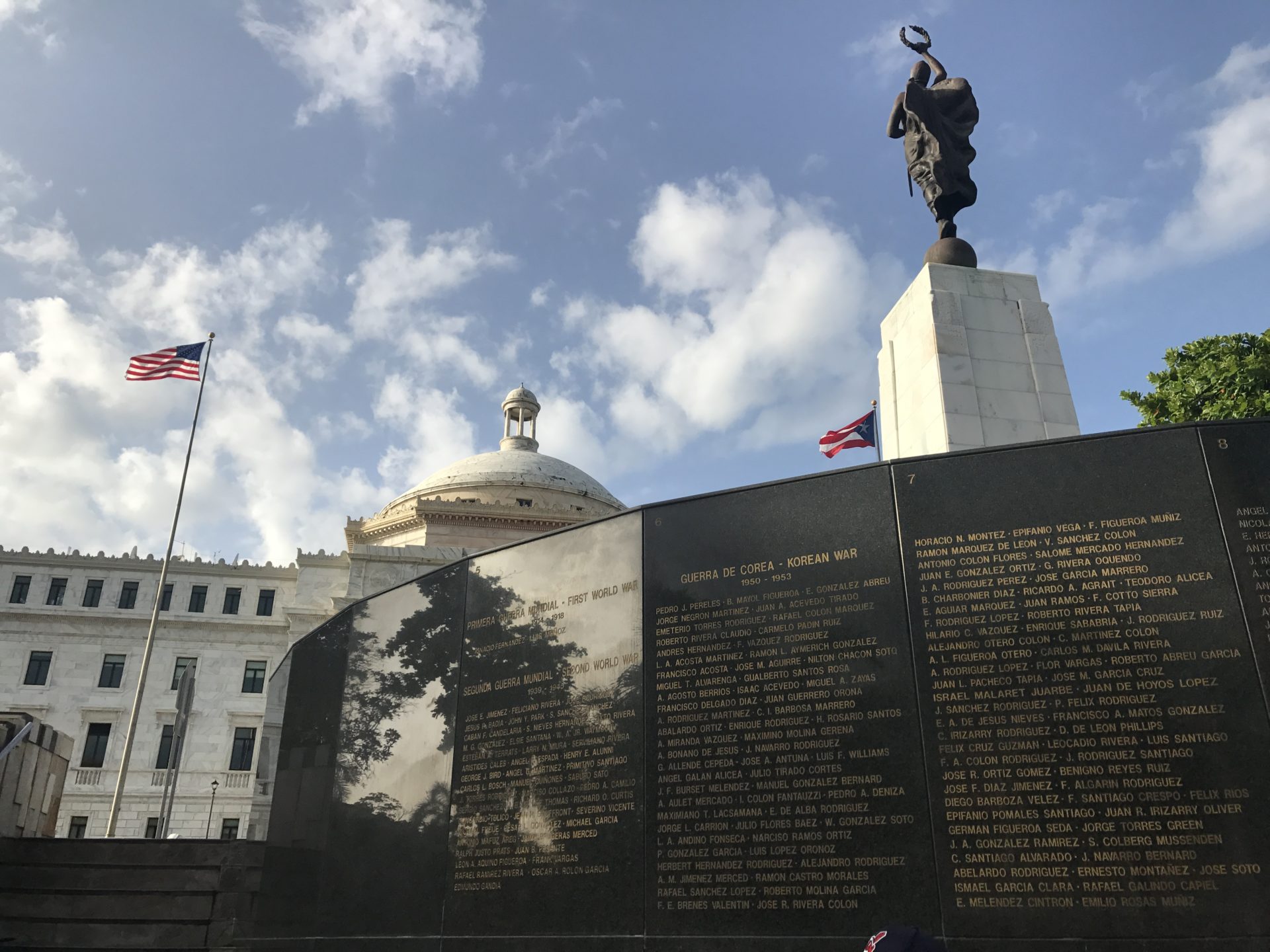Veteran Stories
– I’m your master of ceremonies during this event. We gather here today to present a flower wreath in honor and gratitude by… to the fallen soldiers of the Korean War buried and memorized in this cemetery, and to thanks the family members for their sacrifice. Please, stand up if you can. For the… in honor of our fallen heroes.
Please, be seated. We would like to thank the presence of Mr Glenn Power, deputy undersecretary of the. President of the Korean-American association of Puerto Rico. Member of the Remember 727 Organization for Korean War Veterans. Ms… President of 65th Infantry veterans. Member of the 65th Infantry divisions were engineers, family members. And now we have Mr. …. director of the Puerto Rican National Cemetery with a short message.
– I’m going to… I didn’t know I had to give a short message. But another things, uh, thanks him for actually taking time and making this possible. I’m very proud of the 65th Infantry … for their service in Korea, World War II and other places. They went to Panama, all the places that they served. And I was just talking to Mr. Glenn Powers about how all this as a society in Puerto Rico. We don’t give the honor to our servicemen. So, I think today with this short, small ceremony, we are honoring our Korean veterans and all that… year. And, also, the veterans that we have here and… all our respect. Thank you for being here. Thank you for what you’re doing. And welcome to our cemetery.
– Now we have Ms. Hannah Y Kim, member of the 727 Organization for Korean War Veterans.
– Gracias muchísimo, ah, por su hospitalidad y su dedicación de, para mis abuelitos. Yo soy, yo me alegro muchísimo porque yo estoy aquí porque ustedes fueron allí en Corea y yo estoy aquí con ustedes y mis abuelitos, quienes pasaron sacrificios últimos. Y no solo estoy aquí, estoy aquí con todos los coreanos, como presidente lee y representante de corea, porque no, ellos no pueden, ellos no pueden venir aquí, sí, y por eso yo estoy aquí para decir a ustedes gracias muchísimo, para todos. Y nosotros, coreanos americanos, como yo, y coreanos en Corea y coreanos en todo el mundo, nosotros disfrutamos libertad porque ustedes fueron en Corea y nosotros nunca, nunca olvidaremos. Gracias muchísimo, gracias, Javier, y gracias muchísimo.
– …and Mr. Javier Morales… Mr… to honor with your presence and… To place the flower wreath in honor to our… in the Korean War.
– …mis abuelitos. Gracias.
– Pueden ir todos, por favor.
– Sí.
– I… War… of the island. I joined the army when I was 23 years old. That time, I had my training here in Puerto Rico and I was in all the places throughout the island serving on the World War II. There… Puerto Rico to South Africa, North Africa and then to Germany. In the… there wasn’t so much to do there, just clean pockets of the Germans. You know? Germans… clean the pockets of. From there I return to the island, then I, uh, I was out of the army. Then I went to study because before I had only eighth grade… the country. And the… I coursed my high school in another town in the center of the island called Barranquitas, … I had my high school diploma and then I moved to the nearest city of Puerto Rico. From there, I graduated and I went to the, to teach in Puerto Rican schools of Puerto Rico. But since then, I have my sedentary done and then out of… They happen to be I didn’t know about, but I was in the reserve when this… 1996 went to Korea. I was called into the field. I was sent to Korea. So, there, I fought in Korea. I was wounded in Korea. I returned to the streets and I was… help because… and I was sent to Germany to serve for 23 years. I was sent to… I served there one year. At that time, I had two sons, they were out of the… same place they died there. That’s the only thing that I will regret all my life. So, I know what the father and mother know and think about their son going to war. So, I went to war and my father said, “It’s time to war”. So, that’s life, what can I say? I am grateful to God, grateful to people that are around me now. People that are… there… Right now I’m 95-and-a-half years old and I still…
My only daughter died two months ago. One month back. And she comes here to be buried here. Today and talk to people here… So, I’m glad I don’t die. I don’t want to die, but… in the… another time… somebody will follow you. I’m very grateful, and thank you, people, for being here and taking care of us, and say hello to us and appreciate what we did in Korea. You probably know that… Korea… What I saw there and the people there. What the people did to us, I appreciate it very much. …and to people… not only myself, we were 19 of us, right? And we appreciate it… Korea. We appreciate that. Thank you again. I went to the country, how it was. Wartime. Everything destroyed. Very dead people. People dying by me. Many things. Very hard for me to tell, very hard to me to tell things like that. It’s another fight. No, no. The only thing I remember was I was there in … And walked all the way down to Seoul. And we fought and that was it. Until I was wounded and taken to home. I had no time to see the country or talk to the people in the country, meet the people in the country, nothing whatsoever. Which now I am very happy to… know the people. The Korean people now. I really appreciate it. And to say to other people what the Korean people were at that time and the way they did… Korea… this today. It’s very different. Very different. But I…
– Do you remember the name of the battle?
– No, we didn’t have time to that. We fought all the way through and the enemy was upon us. Nothing done. You’re fighting, fire. That was that. Bad. Terrible. I say that there should be no wars. Because everything… When there is a war, everything is destroyed. Including the people. Everything is destroyed. The city. The… Everything is destroyed. I hope… our island Puerto Rico for United States. I want to be clear…
– You too?
– I thank the Korean people, because when I visited there, the way they treated me or the people that went there. Good. Nice. And they showed us the way Korean is today… The country of Korea is today… Nothing… So, I, uh… I feel that when I lived in Korea. Little… The people of Korea… for Korea…
– To the cemetery,
what would you think?
– I want to tell you something.
… what I say. I’m going
to tell you something, you know.
– Okay.
– I joined the Army in 1940.
I was 17 years old.
I trained in Tortuguero, Puerto Rico.
Then went to Fort Neal, West Virginia.
From Virginia, we went to North Africa.
And so we headed. We landed there
with 40 dead because we had a kennel.
Because we had a coronel who don’t believe
that puertoricans were their friends.
He went there and kill it… Somebody killed it.
I said everyone in North Africa, they all went to,
uhm… Germany.
Yeah, and I always tell
… about 10.000 prisoners.
… The coronel called, he used to be a commander.
So I came back to Puerto Rico and stayed here.
Then, they planned the work, the maneuver…
Porter maneuver to certificate
that it was the best way to…
That’s what they said, to Korea…
They fought everything. so, myself was
the driver of Mayor General Harris,
so we left him in here, in Puerto Rico.
1950… December, 1950. So we went
in the Marine links, about 16.000 soldiers.
so we land in Busan. So, at the next day, we …
fight in the front, so I used to be the driver
and bodyguard from Coronel Harris.
So, I had a… with Coronel Harris.
So, one day, General McArthur stopped us himself
and he told to General Harris,
“you have to go to that hill
and throw the people in there.”
I remember that.
And General Harris said,
“no, my people has to come back to me, now.
They’re going to rest.”
So, I thought, uhm… He was, you know,
disobeying an order from a Mayor, a General,
he was a Coronel. So, well he left him over there,
So, I know we have a hook for,… in spanish and english.
So, we have everything that the guys have said.
That’s to believe. Because I spente 11 moths in there
with the Coronel and a mission… heave, we go.
I never really thought…
The day the guy walked in the kitchen,
the Admiral used to chew for…
And in the showers, the showers came down from the hill.
We didn’t know it came from the hill.
He said “my girl is washing there, so…”
So, I went down… three pieces of…, you know,
because I knew everything was alright.
The ’65 is one of the best in the world
I know, because I used to be the driver
for Mayor Coronel Harris. We sailed in maneuver.
We were five rocks from…
Then we left for…
And one of the guys said “load the arms”
and one guy from my hometown, they got a .45.
And when you load the .45, it fires a shot…
General Cordero, he was a volunteer for…
And that’s the way, if you are very sick…
I really think so, because the puertorican who
sailed there,… sleeping back, about 20 degrees.
Also, in North Africa, … we slept in there,
the valley… at 32 degrees.
We had to go to the river,
That’s the way…
I used to go with General Harris,
I uses to be the driver.
– But what do you remember?
– I remember the day.
– What did you feel?
– One day, he went to… We were below that,
everything, we didn’t know that they were hiding.
And one morning we called, so they came down
when we started the kitchen, you know, boiling eggs, the breakfast.
And they called out:
“Everybody! I have a job for our company,
every one of you have to kill seven guys.”
– Oh.
– Wow.
– That’s all I have to say. My brother,
he was a policeman, he.
So, we had so many points and they gave me
the break and sent me first.
Yeah, because, I mean…
The korean, yeah. We fought along that people,
you know, together. And they did.
They had this little sack and that’s where.
– Did you volunteer to fight for Korea?
– No, because I used to be a driver
for the Army, Fort Maneuver.
– Yeah, but did you volunteer to be the driver?
– Yeah.
– Volunteer?
– Yeah.
– Why? Why.
– Because I said “fine”, a day that I went to…
No, I forgot the General, to drive to Korea.
they said four days, and they selected me
to be the driver.
They were looking for a man to follow him,
the General.
Well, I’m telling you,
the worst would be the war.
Because I had to be the devil or the saint.
For example, I’m in Puerto Rico, what happens now?
They say I can’t walk, you know why?
Because that guy up there, he sees everything.
I’m alive because my mother,
she promised for me three times.
Three times. I’m alive because of her.
Look, …
but that one is the one that kept me alive.
Don’t worry. I’m 93 years old. Suffer? Suffer.
– The south korean people. Message.
– Korean people.
The korean people were, for me, the best people in the world.
Because I was with them, fought beside them.
We went over there, they were over there.
They give everything that people,
I remember that.
The people that were over there were…
I’d like to go back over there,
because they treat puertoricans like.
A friend of mine, he went.
– …Cardónez. About the battles in Korea, I only remember that I was a lifer man, I was, all the time– Most of the times in different lines. When we arrived in Korea with the 63rd Infantry, that was the 6th battalion of the Infantry regiment. And we arrived in Korea on 1 October 1950. So we started going in patrols, because by that time [inaudible] elements, and probably the worst one when China came into the war. There were too many Chinese for us. And I remember that we were, I mean, the first division in the U.S., it was in the [inaudible] war. Is that right?
– Yes.
– So it was November, 1950 when China entered into the war, and the first thing they were trying to do was to finish with the Marines that were taking care of the reservoirs. So, it was winter, 1950. The water was up here, about our knees, and the Chines almost destroyed the Marine division, and the 63rd Infantry were holding the Chinese to help the Marines get out of the– and go to the port of [inaudible] in Korea. So…
– And you were part of that?
– Yeah. The 65th Infantry regiment was the last unit left in North Korea during the US [inaudible] in 1950, and — when we got into the ships that were about 15 or 20 miles in the sea, our regiment put a lot of dynamite in the port, and as soon as we left, they destroyed the [inaudible] in order for the Chinese to use any– for the moment. We were taking to Pusan– everybody was taking to Pusan. And– it was– we went into the ships, it was on 24 December 1950, Christmas time. And we had– they gave us supper on the ship, so we’ve been more– removing our clothes, and when we’re taking into the ships, we were ordered to take our clothes, and they gave us clean ones, clean clothing. So, after taking us to Pusan, they assigned us positions 12 or 15 miles at the North of Pusan. The January 1, 1951, I was assigned to this [inaudible] the 3rd Infantry division. When I stayed for 6 months– July, the same year, I think, 1951, I went back to my company, the Infantry division which was in the front. So, in September, 1951, we were attacking the hill at the west of Ch’orwon, there are hills at the west of Ch’orwon. Ch’orwon is about 20 miles from the parallel, up. And– with the [inaudible], the Chinese were all around, and they were attacking us with urgent. And it was raining like hell. It was in September. And I was trying to– we received orders to leave the place. I was assigned [inaudible] one of that. I don’t think the North Koreans are [inaudible]
– On 18 September 1951, we were capturing one of the hills. As I told you, it was raining like hell, and the artillery, the Chinese artillery all the time, and we were ordered to go back and leave our place. So, there were 12 comrades there already, and I was assigned to carry one of them out. When I was taking care of my comrade, I was hit in the back by Chinese artillery, and I have to leave him, to leave the dead man I was carrying. So, I was taken back to the line, to the resting line, and I was taken to some doctor, and — by that time, I had spent almost 14 months in Korea. And I never went back to the front line. They continued to [inaudible] to take me out of the front lines. So, I entered the Army for three years to volunteer. I can tell you that when I graduated from High-school in my hometown, I entered to work in a drugstore. And on 20 June 1950, I entered to volunteer in the Army to study for officer at the canals in Panama. Five days later, the North Korea, at that time, South Korea, and we were sent to the canal zone, and it was basic training. And when we finished the training, the company commander asked me that they wanted me to stay at the pharmacy in Panama, and I said, “No, I want to go with the Japanese.” So I went volunteering to Korea. I went volunteering in the Army, and volunteering to Korea.
– Why?
– Because at that time, I was 20 years old, and I liked adventures, I liked risky scenes.
– But you could’ve risked your life.
– That was something included in the package. So, I studied three years in the Army, and– get my [inaudible] studying at the University of Puerto Rico. I worked for the government for 23 years, and at the four years studying makes 27, and three years in the Army makes 30. “It’s time to get out of the government.” So, in 1881, I had been working by myself as a lawyer.
– Yes. One more question because you said that you wanted to risk your life for adventure, and you could die. But here, you’re at the cemetery, with comrades who did die. What do you think when you come here?
– Well, we come here because we’re alive to honor them with our visit here. And we do the best we can to have this place as it is.
– Are you glad that you didn’t die, though? I am, I’m glad.
– I’m glad. I’m glad I’m alive. And I– when I saw Korea last September, it was like a miracle because– Korea was all destroyed, and now they have this beautiful country, beautiful Seoul, the capital. And nice people everywhere and I’d like to do there again. Sometime, I will.
– Soon.
– It was nice to have you here, and I hope you enjoy your stay in Puerto Rico.
– Thank you so much.
[ININTELIGIBLE]
– My name is Javier Angel Morales. I am the past president of the 65th Infantry Veterans Association. I served for about 5 years. Our organization [inaudible]. And they were the ones who organized this whole association in 1936. At one time we had numbers of about 500 members. Now they only have about 150. They had to open up the association to allow veterans from other conflicts or wars to become members, because we want to continue the legacy that the 65th infantry gave to Puerto Rico. As to the Borinqueneers, there was a voluntary army, first [—] in 1917. They were all voluntary. They didn’t have to be drafted. The draft came in World War II. After World War II then came Korea. During the Korean War there were a lot of draftees. I could relate to some of the stories given to me by the different veterans, who were in smaller towns, but when they heard that there was a truck coming picking up those that would like to join the service, they jumped on the truck and were taken to [—-]. Some of them… one person told me that it was the fourth time he was trying to get in the truck, but they turned him down because his age was not the legal age to be drafted. [inaudible]. The regiment was composed of veterans that were from World War I and II. They had been volunteers and they were ready to retire, but they were asked to stay so they could train the new recruits, so most of them did that. That’s why I think the regiment was so…
– Experienced?
– So experienced during the first years of the war, that they were labeled [—-].
– How many served and how many suffered [—-]?
– The count that I have from Puerto Rico was about 63,000. Out of those 63,000, there were 2,700 that were wounded in action. There were about 740 that were killed in action, and out of those 740, there were 122 that were missing. Currently I think there’s about 110 or 112 that are still missing in action. And as they find their bodies or they’re able to identify them, they are added to the Wall of Remembrance in San Juan.
– So, if there’s… I know the 65th earned the congressional gold medal.
– Yes.
– Of course I’m partial, I know they deserved it, but not everybody knows. So, why?
– Okay. The regiment was very successful. They had a maneuver in Vieques called Portrex. They went against the best unit from the United States [——], and they were able to repel that invasion. So that stayed in the mind of Colonel Harris, and when Colonel Harris was in Korea, they asked him that they needed an infantry unit to be able to go to Korea because they were running short. So he said, “Well, I had a regiment I’d like to bring here.” and he mentioned the 65th infantry regiment. But they were… the high brass was very reluctant, because one of the things they said is, “But they never fought during World War I.” Only one battalion fought, which was the 3rd battalion. There were two casualties. And during World War II, they were mainly to secure… or security, of the different bases, of the different places in the Caribbean and in Europe. During the Korean War they were an infantry regiment, and they were well prepared because, like I mentioned before, a lot of them were veterans from World War II. They had experience, they had training necessary to be in battle. And so, that training went on to the new recruits that came in. When they got to Korea, they were instrumental in helping the 1st [—] division exit from the surrounding by the Chinese. Although the Chinese were pushing us back into the sea, the 65th regiment was the last unit to disembark, or to get on the boats, because they were the last ones that were safeguarding the back of all the other soldiers.
– Two last very simple questions. One is, you’re not even a Korean War veteran, why do you care about them so much? Okay? So that’s one. Two, tell the Korean people why they shouldn’t forget.
– When I was in the service, I was serving in Germany, and one of my fellow compatriots mentioned the 65th infantry. I never knew anything about the 65th. I wasn’t interested because I just wanted to serve my two years and leave. When I retired at 60, there was another instance, where I was in Connecticut and I overheard somebody say, “The 65th? They didn’t do anything right.” And that kind of stayed on my mind. I said, “I have to find out about that.” So, when I retired at 60, I said, “I need to go to Puerto Rico, because I want to see Puerto Rico.” [——–], and I did that. But before that, I told my wife and she started crying, and I said, “What’s the problem?” She says, “Well, you’re going to get old on me, and you’re going to die.” And I said… that scared me, and I said, “No, no, no. I have to do something.” So I came to Puerto Rico. Six months I went around the island. This time my brother was calling me. He says, “Look, I need you to help me.” And I said, “Help you what?” He said, “I need you to help me find veterans that were wounded, because I want to start an organization in Puerto Rico called The Purple Heart Organization, to be able to recruit and have a chapter, a register in the national Purple Heart Hall of Honor.” And I said, “Well, I’ll see what I can do.” Meantime, the president of the 65th infantry association was after me telling me the same thing, “Look, I need your help. You’re the youngest, and I need to make sure people don’t forget this organization.”
– So, to the Korean people, why should they not forget the Borinqueneers?
– To the Korean people, first of all I want to thank them very much, because I had the opportunity to go to Korea, and the 65th infantry was very instrumental in safeguarding the country. They were very instrumental in making sure that democracy was installed in Korea. They were very happy to be able to defend your country. A lot of them gave their rights [?], they shed the blood, and they shed the tears. But they did it for a purpose. They wanted you to be happy, your generations in the future to be happy, to be able to live in democracy. And so, the sacrifice that was made by the 65th infantry regiment was not done in vain, your country has progressed quite a bit, your people are very nice, and we really appreciate the way you think about us, the Puerto Ricans and the 65th infantry regiment.
